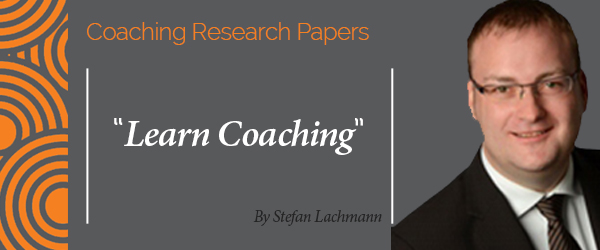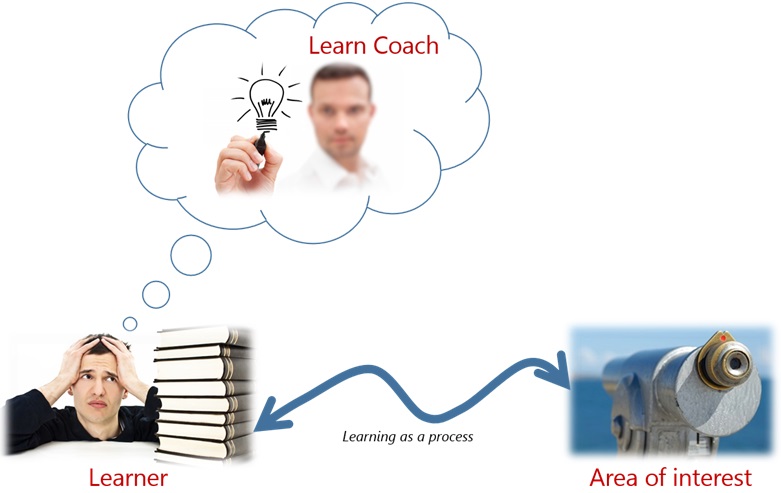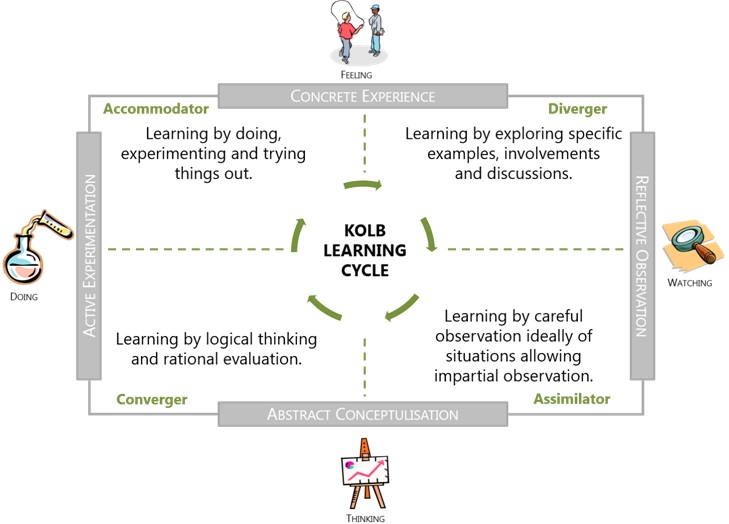
Research Paper By Stefan Lachmann
(Learn Coaching, GERMANY)
1 Introduction
Learn Coaching is an expanding niche in the coaching environment especially in Europe. Changes in the educational landscape and learning behaviors of students and adults have led to the requirement of identifying approaches to learning beyond didactical methods. As a result, learn coaching is entering the field of education.
The purpose of this research paper is to develop an understanding of learn coaching as an expanding coaching niche and to identify required competences of learn coaches and methodologies used in this fairly new area of coaching.
Oscar Wilde once said:
Education is an admirable thing, but it is well to remember from time to time that nothing that is worth knowing can be taught.
In fact, this quote forms the essence of learn coaching: Teaching does not provide knowledge. Knowledge requires experience and reflection.
 Figure 1: Learn Coaching is about experiencing and reflecting on knowledge; not about transferring knowledge.
Figure 1: Learn Coaching is about experiencing and reflecting on knowledge; not about transferring knowledge.
2 Research Method
Due to the heritage of the author of this research paper, the research has been performed in Germany. Several literature on the topic of learn coaching has been identified and used to provide an understanding of learn coaching in general as well as to identify the boundaries to other areas of coaching.
In addition to literature research, interviews have been performed with learn coaches in Germany. Especially in the field of Neurolinguistic Programming (NLP), learn coaches are professionally educated and developed as a niche of NLP, but also educational institutions start developing teachers to become learn coaches (Pallasch et. al, 2012).
Finally, internet research complements the research on learn coaching.
 Figure 2: Literature research on focus.
Figure 2: Literature research on focus.
3 Research Results
3.1 Terminologies
3.1.1 Learning
Everyone has a different understanding of the term ‘learning’. Some may think about learning in terms of ‘understanding’. Others may think about learning in terms of a ‘process’. In other words, the term learning is a subjective construct (Pallasch et al., 2007).
People also have a different experience with (the term) ‘learning’. Some have a very positive experience and connect learning with gaining experiences and developing themselves for good. Others again have a negative impression of learning. They may recall stressful situations with learning and consider learning as tough work. In the end, our experiences form our feelings about the term and process of ‘learning’ – and such feelings generally remain for the rest of our lives (Eschelmueller, 2008).
From an academic perspective, the term ‘learning’ can be defined as followed:
Learning is the act of acquiring new, or modifying and reinforcing, existing knowledge, behaviors, skills, values, or preferences and may involve synthesizing different types of information. The ability to learn is possessed by humans, animals and some machines. Progress over time tends to follow learning curves. Learning is not compulsory; it is contextual. It does not happen all at once, but builds upon and is shaped by what we already know. To that end, learning may be viewed as a process, rather than a collection of factual and procedural knowledge. Learning produces changes in the organism and the changes produced are relatively permanent. (Schacter et. al, 2011)
3.1.2 Coaching
The term coaching in its professional meaning is barely known by people. In fact, coaching is often misunderstood as a form of consulting. Especially in Germany and boundary countries, i.e. Austria and Switzerland, coaching is ‘officially’ understood as a professional form of consulting where the coach provides a certain degree of advice to the client. In this regard, coaching ranks right next to supervision and mediation (Rauen, 1999).
According to the International Coach Federation (ICF), though, coaching is a clearly separated approach to developing people where the coach does not provide any advice to its clients. ICF thereby defines coaching as followed:
ICF defines coaching as partnering with clients in a thought-provoking and creative process that inspires them to maximize their personal and professional potential, which is particularly important in today’s uncertain and complex environment. Coaches honor the client as the expert in his or her life and work and believe every client is creative, resourceful and whole. Standing on this foundation, the coach’s responsibility is to:
This process helps clients dramatically improve their outlook on work and life, while improving their leadership skills and unlocking their potential. (ICF, 2014)
For the purpose of this research paper, the definition of coaching by ICF is used as it aligns best to the approach of learn coaching.
3.1.3 Learn Coaching
Considering the previous two explanations of ‘learning’ and ‘coaching’, learn coaching can be defined as the process to support the transfer and assimilation of knowledge by clients, i.e. the learner (Pallasch et al., 2012).
In contrast to conventional didactical methodologies, where the relationship between the teacher and the learner is essential for a successful knowledge transfer and assimilation, learn coaching focuses on the learning topic and the learner, i.e. without the recognition of someone transferring the knowledge, such as a teacher. This approach highlights the definition of ICF: “Coaches honor the client as the expert in his or her life and work and believe every client is creative, resourceful and whole.” (ICF, 2014) So, the coach supports the learner (= client) to identify ways to gather knowledge, understand such knowledge and to assimilate knowledge accordingly. Figure 3 shows the main dimensions of learn coaching.
 Figure 3: Dimensions of Learn Coaching
Figure 3: Dimensions of Learn Coaching
3.2 Processes
The processes of learning and coaching differ, but are important to understand where learn coaching is embedded in the educational landscape. Hence, an understanding of the two different approaches is provided in the following two chapters.
3.2.1 The Learning Process
The most popular approach to learning is described by David A. Kolb and is based on experiential learning theory. David Kolb’s so called ‘Experiential Learning Model (ELM)’ or ‘Kolb’s Learning Cycle’ outlines two approaches towards grasping experience, i.e. Concrete Experience and Abstract Conceptualization on the one hand, and the two related approaches towards transforming experience, i.e. Reflective Observation and Active Experimentation (Kolb, 1984). Figure 4 shows the full Learning Cycle.
 Figure 4: Kolb’s Learning Cycle
Figure 4: Kolb’s Learning Cycle
According to Kolb, it does not matter where learning begins. In fact, it is a matter of the learning style of the individual. In this regards, Kolb has identified the following four learning styles:
Diverger
The Diverger learns best by exploring specific examples, involvements and discussions. His comfort zone is based on a mix of concrete experience and reflective observation.
In this regard, he enjoy real life experience and discussions about them, is imaginative, seeks for more than one possible solution, performs brainstorming and group work and observes rather than takes action to learn.
Assimilator
The Assimilator learns best by careful observation; ideally of situations which allow impartial observation. His comfort zone is based on a mix of reflective observation and abstract conceptualization.
As opposed to the Diverger, the Assimilator prefers theories and facts as well as theoretical models and graphics. He enjoys lectures and numbers and defines problems in logical formats. Nonetheless, just like the Diverger, the Assimilator also prefers talking about the rationale of the learning topic rather than handling it.
Converger
The Converger learns best by logical thinking and rational evaluation. His comfort zone is based on a mix of abstract conceptualization and active experimentation.
In contrast to both, the Diverger and Assimilator, the Convergers handles the learning topic. He is ‘hands-on’ and enjoy theories as well. Analogies and specific problems are in the center of his learning to test hypotheses and to find the best answer. A problem solving mentality while working on his own characterizes the Converger’s approach to learning.
Accommodator
The Accommodator learns best by doing, experimenting and trying things out. His comfort zone is based on a mix of active experimentation and concrete experience.
In this regard, he is the ‘doer’ in the group of learning styles. He is ‘hands-on’ and concrete and wants to do thinks to learn a subject matter. He asks questions fearlessly and challenges theories to adapt methods to real life situations. Preferring gut feeling as opposed to logic characterizes the accommodator.